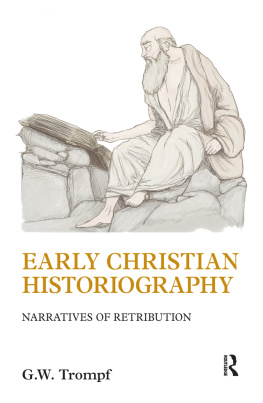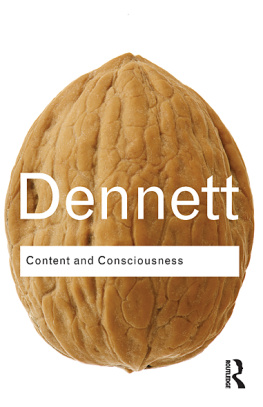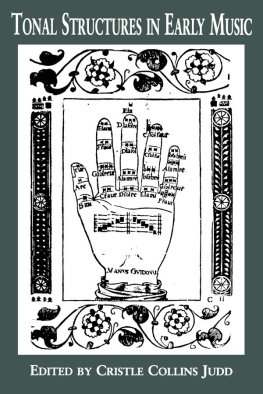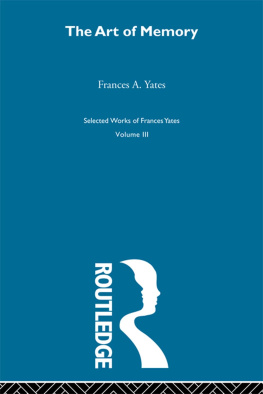First published 2000 by Continuum
This paperback edition published in 2007 by Equinox Publishing Ltd., an imprint of Acumen by arrangement with Continuum International Publishing Group Ltd.
Published 2014 by Routledge
2 Park Square, Milton Park, Abingdon, Oxon OX14 4RN
711 Third Avenue, New York, NY 10017, USA
Routledge is an imprint of the Taylor & Francis Group, an informa business
G. W. Trompf 2000
All rights reserved. No part of this book may be reprinted or reproduced or utilised in any form or by any electronic, mechanical, or other means, now known or hereafter invented, including photocopying and recording, or in any information storage or retrieval system, without permission in writing from the publishers.
Notices
Practitioners and researchers must always rely on their own experience and knowledge in evaluating and using any information, methods, compounds, or experiments described herein. In using such information or methods they should be mindful of their own safety and the safety of others, including parties for whom they have a professional responsibility.
To the fullest extent of the law, neither the Publisher nor the authors, contributors, or editors, assume any liability for any injury and/or damage to persons or property as a matter of products liability, negligence or otherwise, or from any use or operation of any methods, products, instructions, or ideas contained in the material herein.
British Library Cataloguing-in-Publication Data
A catalogue record for this book is available from the British Library.
ISBN-13 978 1 84553 188 1 Paperback
Typeset by SetSystems Ltd, Saffron Walden, Essex.
It was one of the chief tasks of ancient historians - whether Semitic, Greek, Latin or even Chinese - to defend collective preconceptual outlooks on the world, and especially to maintain that the course of human affairs reflected a 'moral order'. Early Christian historiographers accepted this same role by demonstrating history's providential governance in connection with the Church as the new people of God. With this outlook they adapted yet transformed both the Hebrew and Graeco-Roman heritages of history-writing: the cosmic specialness of Christ's ekklsia substituted for Israel's chosenness, and the message and values of the Church became the means by which the achievements and weaknesses of empire were to be judged. In this volume I examine these processes by focusing on the way Christian writers saw God's rewards and punishments instanced in events. It is a book about notions of retribution, and the perceived logic of their relationship to past events deemed worthy of narration. It assesses degrees of concern in the first history-writers of the world's most widespread monotheistic tradition to discern divine justice in human affairs.
What actually or probably happened according to ancient Christian records will bear rather less attention in this book than assessing how historiographers, and those influencing them, 'constructed' or 'constituted' reality. The mentalits of early Christian history-writers, their explanatory frames of reference, their meaning-building, even certain developing ideologies, will be the primary subject-matter. Insofar as all these elements will be rendered intelligible they also form important data from the distant past, but in the chapters following it will be the history of historiographers' ideas, pre-judgemental attitudes and (often sub-textual) 'mind-sets' that will be being documented, not the actualities they purported to describe. The transformations under consideration are conceptual, hermeneutical, sometimes doctrinal, and all just asking for treatment.
This is thus a doggedly exegetical study, designed to probe and get behind texts rather than to regurgitate facts. Beginning with a theoretical and anthropological introduction to 'the logic of retribution', to tap thought-modes generating the need to record outcomes in human affairs as 'just' or 'merited', I sketch the developing application of retributive principles in historical narratives before Christ. The hermeneutical analysis then takes the readers steadily from the New Testament evangelist Luke (whom I consider the first Christian historian) to Theodoret of Cyrrhus in the Eastern Roman Empire and 'Paulus' Orosius in the West. The important memorials of Hegesippus, Arnobius, Eusebius, Lactantius, Athanasius, Rufinus, Augustine, Sulpicius, Philostorgius, Socrates and Sozomen are each considered along the way, and the story of the accounts is then taken on to the emergence of Islam. The intention is to create a cumulative effect, or to discover the various dimensions of retributive thinking as we proceed, rather than simply re-perceiving 'the same thing' in different historiographical works. Our attentions will certainly have much to do with continuity, with understanding a traditional habit of the historical mind, but still more with interpretative challenges facing different individual minds in different contexts, including impulses to reject certain retributive modes of explicating events.
The book has been brought together from prefabricated building-blocks. The theoretical introduction abbreviates an article in Religioni e Societ, 28 December (1997): 48-72. The rest of the background chapter arises from arguments in J. Emerton (ed.), Studies in the Historical Books of the Old Testament, Leiden, 1979; in M. Blackman, F. Muecke and M. Sankey (eds), The Textual Condition: Rhetoric and Editing, Sydney, 1995; and in my book The Idea of Historical Recurrence in Western Thought, Berkeley and London, 1979, vol. 1. basically reproduces contributions to the Augustinianum's Cristi-anesimo e specificit regionali net Mediterraneo Latino (Sec. IV-VI), Rome, 1994; and to G. W. Trompf and G. Hamel (eds), The World of Religions, New Delhi, 2000. The concluding sections are entirely new, although at the end I defer briefly to arguments in Studies in World Christianity, 4/1 (1998): 65-83.
For encouragement over recent years, I wish to extend my gratitude to Professor Peter Brown (Princeton), and over the long term to Professor Noel King (University of California). For help with discussion over specific matters of debate along the way, I express thanks to Professor Peter Ackroyd (University of London), Dr Katherine Adshead (University of Canterbury), Professors Pauline Allen (Catholic University of Australia), Robert Banks (Fuller), Timothy Barnes (Toronto), Angelo di Berardino (Rome), Averil Cameron (Oxford), [the late] Amos Funkenstein (Jerusalem and California), [the latej R[ichard]. P. C. Hanson (Manchester), Edwin Judge (Macquarie), David Ladouceur (Notre Dame), Joseph Lienhard (Fordham), John MacIntyre and James Mackey (Edinburgh), Raoul Mortley (Bond), Alanna Nobbs (Macquarie), Gilles Quispel (Utrecht), Dr Ronald Ridley (Melbourne), Professors Philip Rousseau (Wellington), Krister Stendahl (then Harvard), Emile Trocme (Strasbourg) and Dr Garth Thomas (Consultant for Gnostica, London).
Many of my colleagues and research associates at Sydney - Professors Eric Sharpe and James Tulip; [the late] Dr Bill Jobling, Ms Ruth Lewin, Drs Carole Cusack, William Emilsen, Dean Philip Esler (now at St Andrews), Dr Moira O'Sullivan and John Squires, together with Professors Rifaat Ebied, Dexter Hoyos and Godfrey Tanner, Drs Peter Brennan, Guy Freeland, Bill Leadbetter and Lynette Olson, Mss Leonie Hayne and Frances Muecke have always been gracious in lending me materials, alerting me to new publications, or in chasing the odd reference. Gratitude must also be extended to the helpful custodians of libraries, especially to those of the Augustinianum and the Vatican, Bodleian, British Museum, New College (Edinburgh), Dumbarton Oaks, Fisher, Gillespie and Moore collections.







